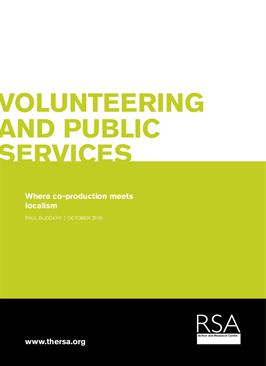As part of the People Shaped Localism programme we look at the rise of public service volunteering as a critical element of local public service delivery. This paper is the first in the programme because we believe that localism should start with the citizen and the community, and their innate Power to Create.
People Shaped Localism project
Public service volunteering is far from being new. But neither New Labour with its vision of volunteering as part of active citizenship, nor the Conservative coalition with its Big Society aspiration for a corrective to the bureaucratic state incorporated it fully in their accounts of public service reform.
Austerity and the advance of devolution are changing this. Important public service delivery strategies now rely explicitly on volunteering. For example, the NHS Five Year Forward View locates much of the energy for sustainable health and social care systems in volunteers. Local authorities across the country are encouraging volunteering and enlisting volunteers as a way of making communities ‘stronger’ and better able to support themselves as traditional interventions by professional services become difficult to maintain.
Yet there has been surprisingly little public discussion. Innovation on the ground has outstripped a debate that is still encumbered by patronising and unduly hesitant attitudes: volunteering is a sticking plaster; it is a danger to collective principles; and even more damagingly (because it draws the wrong conclusions from important truths), volunteering is an activity so diverse and subjective that extreme care should be taken not to kill it with formalism. Public service volunteering has yet to be treated with the same rigour as other aspects of service design and strategic planning.
This paper builds on the insights of an expert roundtable held at the RSA in June 2015. It argues that by expanding formal and informal volunteering, local public services have a positive opportunity to promote wellbeing and social value, move resources towards prevention, and redesign services to be more inclusive, collaborative and accountable to their communities and service users.
Public service volunteering can help to address public service challenges that are not simply financial, but also demographic, cultural and technological – challenges of a scale and kind that would overwhelm any system that casts citizens as consumers rather than engages with them as producers. We need our public services to shift away from point-of-need service delivery that draws predominantly on public resources, and towards preventative interventions that mobilise a variety of public, civic, commercial and private resources. The RSA calls this a shift from social security to social productivity. The paper calls for social productivity analyses of gain, losses and unexpected displacements as volunteering moves from the margins to the mainstream of public service delivery.
The paper suggests that central government needs to recognise differing capabilities within communities and channel investment accordingly. Fundamentally, however, the life of volunteering tends to be played out locally, and it is at local level that services will need to demonstrate greater leadership, invention and collaboration.
pdf 439.2 KB
Contributors

